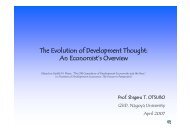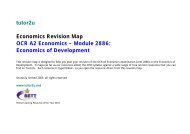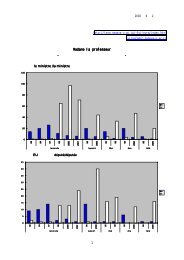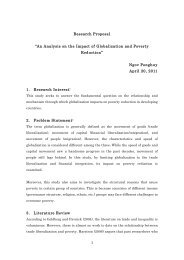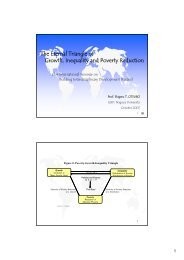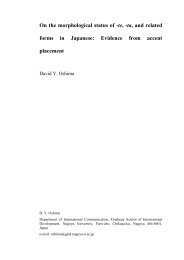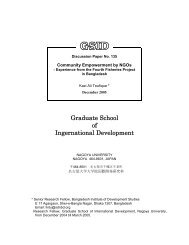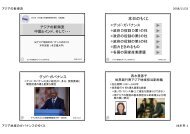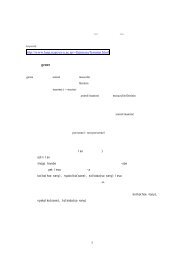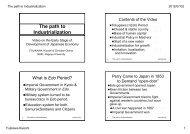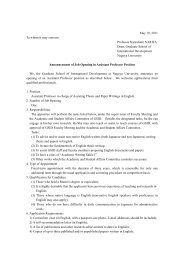Report
Report
Report
Create successful ePaper yourself
Turn your PDF publications into a flip-book with our unique Google optimized e-Paper software.
T OURISM AND TRAVEL RELATED SERVICES 125<br />
sectors of the tourism sector. Due to historical, cultural<br />
and religious connections, Bangladesh will gain<br />
immensely from the regional integration.<br />
Summary of Restrictions in the Bangladesh<br />
Tourism Sector<br />
• No commitments under Modes 1 and 2 in both the<br />
Market Access and National Treatment columns<br />
in the committed sub sector- five star hotels and<br />
lodging services<br />
• No commitments in hotels other than five star<br />
• No commitments in restaurant and catering services<br />
• No commitments in travel agencies and tour<br />
operators<br />
• No commitments in tourist guides services<br />
• Mode 4 commitments almost limited to ICTs<br />
Sri Lanka<br />
Sri Lanka undertook commitments in two of the four<br />
sub-sectors of tourism and travel related services,<br />
namely hotel and lodging services and travel agencies<br />
and tour operators services. For hotel and lodging<br />
services Modes 1 and 2 are unbound in the Market<br />
Access column. However, under Mode 3 there are no<br />
limitations other than those inscribed in the horizontal<br />
section which does not seem to cover this sub-sector<br />
for allowing foreign investment. Likewise, though there<br />
are no explicit limitations under Mode 4, this is subject<br />
to all relevant provisions of labour, immigration and<br />
customs laws. In the National Treatment column while<br />
Modes 1 and 2 are unbound for hotels and lodging<br />
services, there are no restrictions at all under Modes 3<br />
and 4. However, as market access under modes 3 and<br />
4 is highly restrictive, a liberal national treatment may<br />
not make any substantial difference.<br />
In travel agencies and tour operators services while<br />
Mode 1 has no limitations in the Market Access<br />
column, Mode 2 is unbound and the nature of commitments<br />
under Modes 3 and 4 are exactly the same as in<br />
the case of hotel and lodging services. But there is one<br />
major difference – FDI for travel agencies is allowed as<br />
per the commitments made in the horizontal section.<br />
Thus foreign investment of up to 40% of equity in a<br />
company proposing to carry on a business activity in<br />
travel agencies services will be automatically approved,<br />
whereas foreign investment in excess of 40% (and up<br />
to 100%) will be approved on a case-by-case basis.<br />
There are some other provisions in the horizontal section<br />
which may also apply to those foreign companies<br />
that invest in travel agencies services like they will be<br />
treated equally as any company owned by Sri Lankan<br />
nationals if they happen to incorporate their companies<br />
in Sri Lanka. In the case of joint venture when a partner<br />
is a public sector enterprise then while granting access<br />
preference will be given to foreign service suppliers<br />
which offer the best terms for transfer of technology.<br />
Similarly, national treatment accorded to travel agencies<br />
and tour operators services is better than that accorded<br />
to hotels and lodging services because Modes 1, 3, and<br />
4 have no limitations and only Mode 2 remains<br />
unbound.<br />
Although Sri Lanka has submitted its initial offer<br />
during the current Doha Round of negotiations, it has<br />
not yet made its offer public. However, it is learnt that<br />
Sri Lanka has further liberalised the sector and removed<br />
all Mode 3 restrictions (Taneja et al. 2004). It has also<br />
opened Mode 4 to the extent indicated in its horizontal<br />
schedule. However, it is not certain whether changes<br />
have been made in the horizontal section.<br />
In tourism and travel-related services, though the<br />
commitments allow for foreign commercial presence<br />
in hotels and tour operators services, they are subject<br />
to scheduled horizontal measures on approvals, taxes,<br />
and foreign equity caps. Overall, they are not very<br />
meaningful as the coverage of sub-sectors is limited and<br />
there are numerous horizontal measures affecting<br />
investment (Chanda 2005). Apart from making liberal<br />
commitments in the committed sub-sectors, Sri Lanka<br />
should also undertake commitments in tourist guides<br />
services as this sub-sector would be of some interest to<br />
other South Asian countries in view of geographical<br />
proximity and cultural affinity. Moreover, it should also<br />
make sectoral commitments under Mode 4. This will<br />
also be beneficial for other South Asian countries.<br />
Although Sri Lanka has made request on India seeking<br />
full commitments in both Market Access and National<br />
Treatment columns under Modes 1, 2, and 3 in hotel,<br />
restaurant and catering services, it has made similar<br />
commitments in the sub-sector.<br />
Tourism is one of Sri Lanka’s five highest foreign<br />
exchange earners after remittances, textiles, tea and<br />
gemstones. 3 Sri Lanka has made a concerted effort to<br />
draw tourists into the country by shifting its focus from<br />
Western Europe to countries in Asia (Taneja et al.<br />
2004). In line with its objectives, the Sri Lankan airlines<br />
has upgraded its infrastructure and management and<br />
expended its network to get an increasing pie of the<br />
3<br />
www.tamilnet.com/art.html?catid=13&artid=23355, last visited on 16 November 2007.




